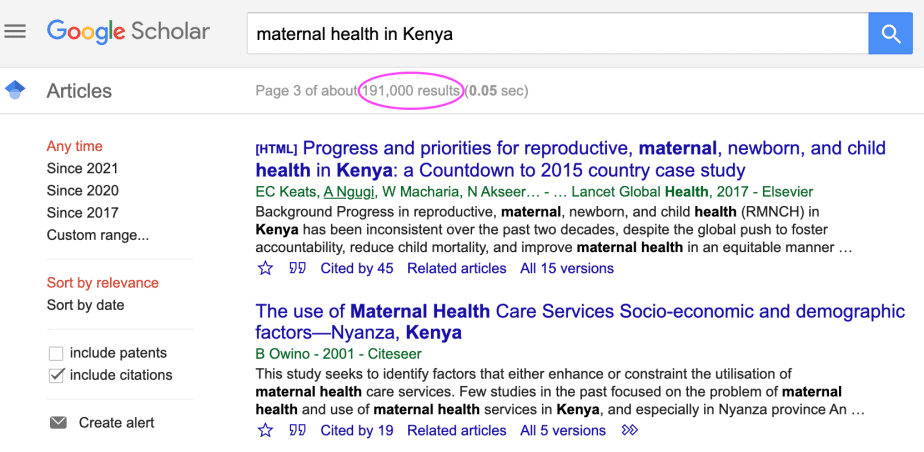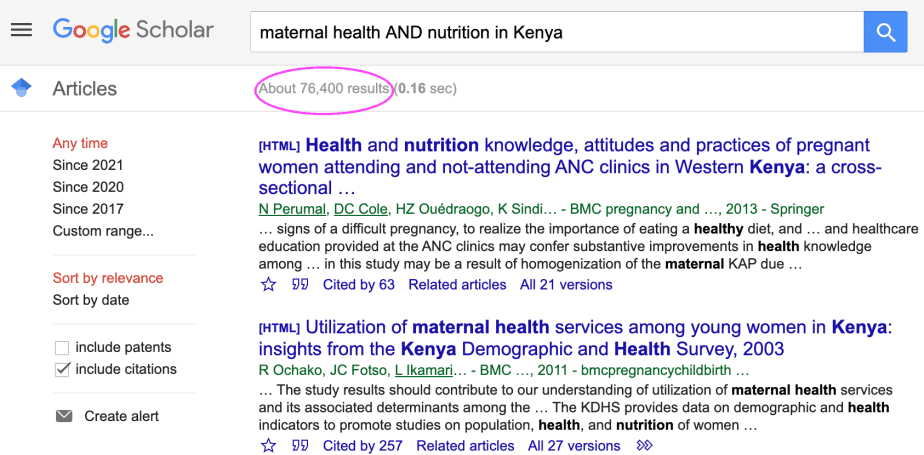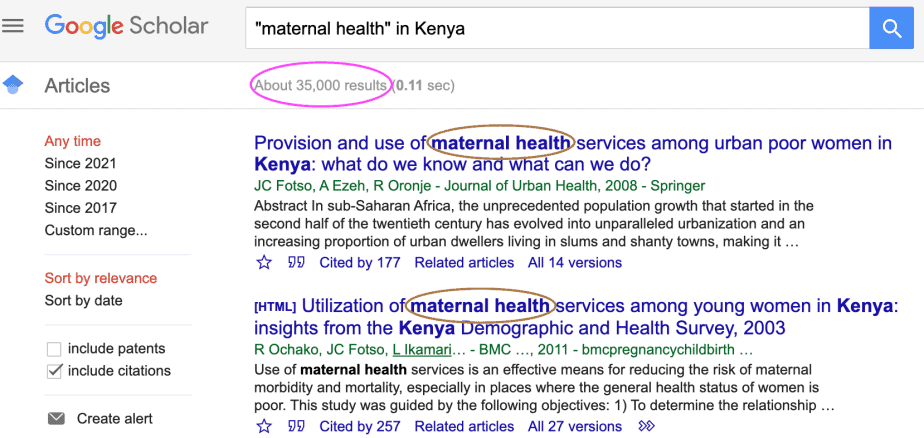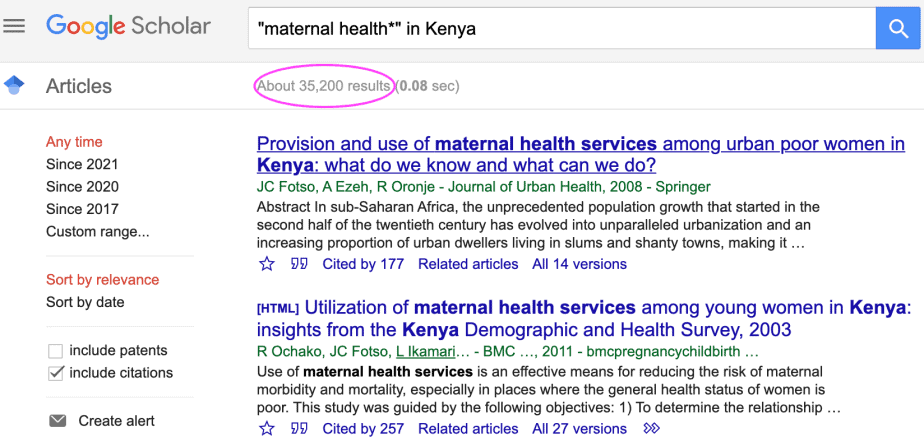As a PhD student, it is not enough to know “where” to search for original academic papers to base your research on. Equally important is knowing “how” to search for original academic articles. This is a skill that develops with time.
Related post: Where To Find Journal Articles For PhD Research: A Beginner’s Guide
One effective search strategy is the use of the Boolean operators and modifiers. This post discusses in detail and with practical examples how to use the Boolean operators and modifiers to find original academic papers from journal databases.
Boolean Operators
There are three Boolean operators that are written in capital letters for them to work in database search. These are: AND, OR and NOT.
Boolean operators are used to either:
- Narrow the search results to exclude irrelevant keywords.
- Broaden the results to include more relevant keywords.
In the process, Boolean operators help to maximise relevant results and minimise irrelevant results.
The AND operator
The AND operator is used when you want to include two or more different concepts or phrases in your search.
Example topic: Maternal health in Kenya
Assuming that my topic of interest revolves around maternal health in Kenya. If I use Google Scholar to search for the topic as it is, I will get the following 191,000 results shown in the image below:

In the example above, all articles that have the keyword maternal health will be included in the results.
I can use the “AND” operator to include other keywords in the search bar that I am interested in. For instance, I may be interested in the role nutrition plays in maternal health in Kenya.
I can modify the search to be: Maternal health AND nutrition in Kenya. This modification will bring the following 76,400 results, shown in the image below:

In the example above, the search results will only include articles that have both the keywords maternal health and nutrition. As a result, the results have been narrowed down to exclude articles that do not contain the two keywords because they would be irrelevant in this case.
The OR operator
The Boolean operator OR is used to combine keywords that are similar in meaning (synonyms) and that may be used interchangeably in academic papers. It therefore expands results to include relevant results that may have been missed if one of the keywords was not specified.
In the example above, maternal health and maternal mortality are often used together within the same context because maternal mortality is a key indicator for maternal health. The search was modified to be: Maternal health OR mortality in Kenya. This search brought 253,000 results as shown in the image below:

The above results have increased by 62,000 results compared to the original search. This is because the use of the OR operator included results that have the keyword maternal health, or the keyword maternal mortality or both keywords used together.
The NOT operator
The Boolean operator NOT is used when you want to exclude certain keywords that are irrelevant to your research. As a result, it also helps to narrow down your search results.
The NOT operator should be used cautiously because it could exclude useful results.
Boolean modifiers
There are three Boolean modifiers that are used in search strategies. They include: quotation marks (“”), asterisk (*), and parentheses (()).
Quotation marks (“”)
Quotation marks are used when two or more words need to follow each other in a search. They are commonly used for keywords that are phrases.
In the example above, maternal health is a keyword in form of a phrase and therefore the two words need to follow each other. To make sure the search gives results with the words maternal and health following each other, we put the two words in quotation marks, that is, “maternal health.”
If the search is modified to be: “maternal health” in Kenya, it brings back 35,000 results (down from 191,000 results) as shown in the image below:

In the initial example where the results were 191,000, the results included articles where the two words maternal and health were together as well as articles in which they were separate. Including the quotation marks excluded the results where the articles had the two words separated and only retained articles in which the two words were together as a phrase.
Asterisk (*)
The asterisk modifier is used to truncate certain keywords that have different variations.
In the example of maternal health, another variation is maternal healthcare. So the word “health” can be added an asterisk which will tell the search engine that other word variations of should also be included in the search results.
When the search was modified to be: “maternal health*” in Kenya, the results increased by 200 to 35,200 as shown in the image below:

Parentheses (())
Parentheses are used to tell the search engine or database the order in which the search should be conducted. This is especially useful if you have several keywords in one search.
Whatever is placed in the brackets will be searched first followed by what is outside the brackets.
An example is the topic: “maternal health*” AND (rural OR urban settings) in Kenya. The 26,000 results from this search are shown in the image below:

In the above example, what Google Scholar did was it first searched for articles that contain the keywords rural settings, urban settings or both and then it paired the results with the keywords maternal health and lastly paired those results with the keyword Kenya.
It is important to note that search engines and databases perform the search from left to right so the order of the keywords as well as the placement of the parentheses matter.
Important factors to consider when using Boolean operators and modifiers
- Know your keywords
Every field has its own unique keywords – the so-called jargons. It is important for students to know which keywords are used in their own fields and note them down before beginning the search process. This will help students avoid missing out on important and relevant papers.
- Play around with different combination of keywords
A search process will yield different results based on what keywords and their combinations have been used. It is therefore important to vary the search terms until adequate relevant results have been found.
- Carry out your searches on a regular basis
Search engines and databases publish new papers on a daily basis. Make it a regular habit to search for new papers so as to stay abreast of new evidence in your topic of investigation.
Alternatively, you can create alerts for your search keywords so that you are notified whenever relevant papers are published. Almost all databases have this function of creating alerts.
In conclusion, knowing how to search for relevant papers for research can save a PhD student precious time and effort by showing only results that are relevant to the topic. On the other hand, it enables a student to find papers that he may not have found if he had used ineffective search strategies. The Boolean operators and modifiers are an effective search strategy that all PhD students should learn and practice.

